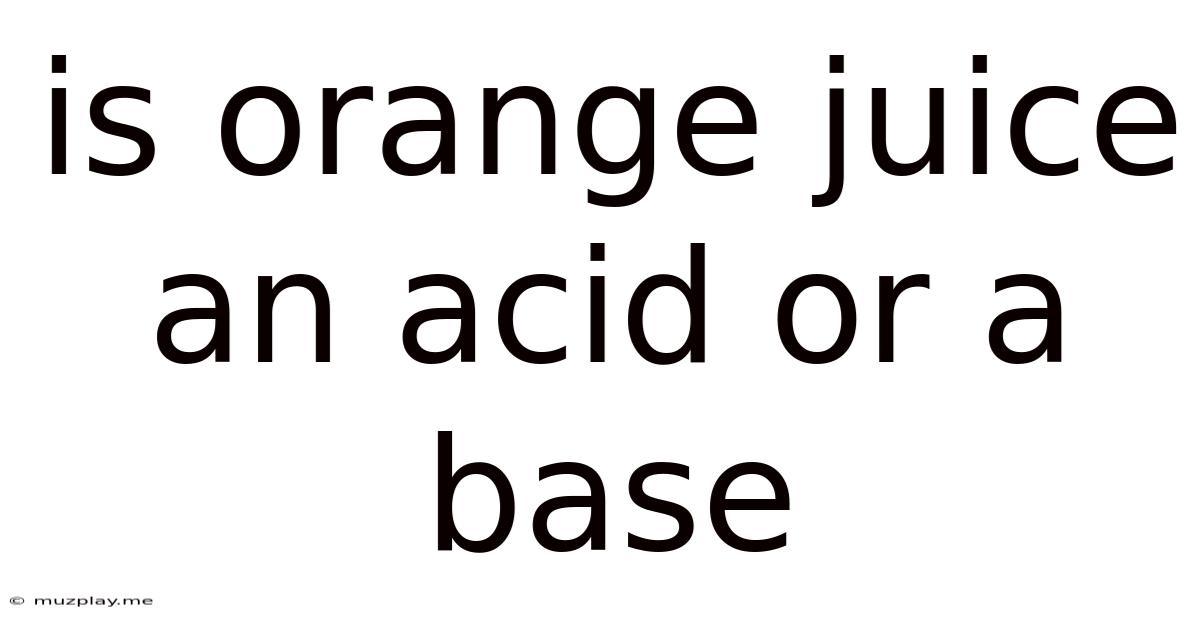Is Orange Juice An Acid Or A Base
Muz Play
May 09, 2025 · 4 min read

Table of Contents
Is Orange Juice an Acid or a Base? Understanding pH and its Impact
Orange juice, a beloved breakfast staple and refreshing beverage, sparks a common question: is it an acid or a base? The answer lies in understanding the concept of pH and the chemical composition of orange juice. This comprehensive guide delves into the acidity of orange juice, exploring its pH level, the impact of its acidic nature, and its health implications. We'll also examine how different factors can affect the pH of orange juice and dispel some common myths surrounding its acidity.
Understanding pH: The Acid-Base Scale
The pH scale, ranging from 0 to 14, measures the acidity or alkalinity of a substance. A pH of 7 is considered neutral, meaning the substance is neither acidic nor basic. Values below 7 indicate acidity, with lower numbers representing stronger acids. Values above 7 indicate alkalinity, with higher numbers representing stronger bases.
Strong Acids vs. Weak Acids: It's important to differentiate between strong and weak acids. Strong acids completely dissociate in water, releasing all their hydrogen ions (H+). Weak acids, on the other hand, only partially dissociate, releasing fewer hydrogen ions. Orange juice falls into the category of a weak acid.
The Acidity of Orange Juice: A Deeper Dive
Orange juice is undeniably acidic, typically boasting a pH ranging from 3.0 to 4.0. This acidity stems primarily from the presence of citric acid, a naturally occurring organic acid found in abundance in oranges. Other acids present in smaller quantities contribute to the overall acidic profile, including malic acid and ascorbic acid (Vitamin C).
Citric Acid: The Primary Contributor
Citric acid is responsible for the characteristic tartness of orange juice. It's a tricarboxylic acid, meaning it contains three carboxyl groups (-COOH), each capable of donating a hydrogen ion (H+) to a solution. This multiple donation capability significantly contributes to the low pH of orange juice.
Other Acids Present
While citric acid is dominant, malic acid and ascorbic acid also play a role in determining the overall acidity. Malic acid contributes to the overall sour taste, while ascorbic acid, or Vitamin C, is an essential nutrient with powerful antioxidant properties. The interplay of these acids results in the complex flavour profile that we associate with orange juice.
The Impact of Orange Juice Acidity
The acidity of orange juice has several consequences, both beneficial and potentially detrimental:
Health Benefits of Orange Juice Acidity:
- Enhanced Nutrient Absorption: The acidic environment in orange juice can improve the absorption of certain minerals, such as iron, from the digestive tract.
- Antioxidant Properties: The presence of ascorbic acid (Vitamin C) provides significant antioxidant protection, fighting free radicals that can damage cells and contribute to chronic diseases.
- Potential Antimicrobial Effects: The low pH can inhibit the growth of some harmful bacteria and microorganisms.
Potential Drawbacks of Orange Juice Acidity:
- Tooth Enamel Erosion: The acidic nature of orange juice can erode tooth enamel over time, particularly with frequent consumption. This can lead to tooth sensitivity and increased susceptibility to cavities.
- Heartburn and Acid Reflux: For individuals with pre-existing conditions like heartburn or acid reflux (GERD), consuming large quantities of orange juice can exacerbate symptoms.
- Potential Interactions with Medications: The acidity of orange juice might interfere with the absorption or efficacy of certain medications. It is advisable to consult a healthcare professional if you have concerns about potential interactions.
Factors Affecting Orange Juice pH
Several factors can subtly influence the pH of orange juice:
- Variety of Orange: Different orange varieties contain varying levels of citric acid, resulting in slight variations in pH.
- Ripeness of Oranges: Generally, riper oranges tend to have slightly higher pH values than unripe oranges.
- Processing Methods: The methods used in processing orange juice (e.g., pasteurization, addition of preservatives) can minimally affect the overall pH.
- Storage Conditions: Improper storage can lead to changes in pH over time due to microbial activity or oxidation.
Dispelling Myths about Orange Juice Acidity
Several misconceptions surround the acidity of orange juice:
Myth 1: All orange juices have the same pH. False. The pH can vary depending on factors discussed above.
Myth 2: Orange juice is always too acidic for consumption. False. While acidic, the moderate acidity of orange juice is generally considered safe for most individuals. However, moderation and mindful consumption are key.
Myth 3: Adding sugar neutralizes the acidity. False. While adding sugar changes the taste, it doesn't significantly alter the pH.
Conclusion: A Balanced Perspective
Orange juice, with its characteristic acidity stemming primarily from citric acid, offers various health benefits, including enhanced nutrient absorption and antioxidant protection. However, its acidic nature necessitates mindful consumption to mitigate potential drawbacks such as tooth enamel erosion and exacerbation of acid reflux symptoms. Understanding the pH of orange juice and its underlying chemical composition allows for informed choices, promoting both health and enjoyment of this popular beverage. Remember to consume orange juice in moderation, practice good oral hygiene, and consult a healthcare professional if you have concerns about its impact on your individual health condition.
Latest Posts
Latest Posts
-
What Was The Outcome Of The Persian Wars
May 09, 2025
-
What Does It Mean When Work Is Positive
May 09, 2025
-
Can Any Substrate Bind To Any Enzyme
May 09, 2025
-
Planned Redundancy Is Not Relevant To Introductions And Conclusions
May 09, 2025
-
What Is The Broadest Classification Level
May 09, 2025
Related Post
Thank you for visiting our website which covers about Is Orange Juice An Acid Or A Base . We hope the information provided has been useful to you. Feel free to contact us if you have any questions or need further assistance. See you next time and don't miss to bookmark.